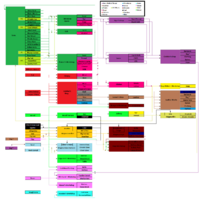- v50 information can now be added to pages in the main namespace. v0.47 information can still be found in the DF2014 namespace. See here for more details on the new versioning policy.
- Use this page to report any issues related to the migration.
Difference between revisions of "Stockpile design"
m (Creating page for DF2014 (330/415)) |
m (Unrating page for DF2014 (s: 261/317)) |
||
| Line 1: | Line 1: | ||
{{Migrated_article}} | {{Migrated_article}} | ||
| − | {{quality| | + | {{quality|unrated}} |
[[Image:DFflowchart.png|thumb|200px|'''Production flowchart for most workshops'''.<br /> Not all items are represented!<br />''(Click to enlarge)'']] | [[Image:DFflowchart.png|thumb|200px|'''Production flowchart for most workshops'''.<br /> Not all items are represented!<br />''(Click to enlarge)'']] | ||
Revision as of 03:42, 9 July 2014
| This article was migrated from DF2014:Stockpile design and may be inaccurate for the current version of DF (v50.14). See this page for more information. |
Workshop layout for efficient hauling
Placement of workshops based around the flow of materials from workshop to workshop can make hauling faster and more efficient. For example, farms near your kitchen and brewery near your dining room which supplies seeds back to the farm.
Farm-centric
Farms feed a wide array of workshops. Farms directly feed the kitchen, still, millstone (or quern) and farmer's workshop. The mill and farmer's workshop feed the loom and dyer which feed the clothier. Farms are in turn supplied seeds from the still, mill, farmer's workshop and dining rooms completing the cycle of life.
As such, it's a good idea to design all these workshops and their stockpiles around each other. Farms can only be built in certain places, so that dictates the location and layout.
Workshop/Profession stockpiles
It's often efficient to design your stockpiles around workshops to ensure they have the materials they need close at hand.
Stockpile placement
One strategy is to place the feeder stockpile immediately around the workshop. This works OK with a single workshop, but it doesn't expand well.
SSSSS S feeder stockpile SWWWS W workshop SWWWS SWWWS SSSSS
A better strategy is to put the workshop's stockpile above or below it. This keeps the stockpiles close to the workshops, lets the workshops expand and you can expand the stockpiles above and below as necessary. It works particularly well with multiple similar workshops working off the same stockpile.
adjacent z-level WWW WWW SSSSSSS WWW<WWW SSS>SSS WWW WWW SSSSSSS
Butcher & Tanning
Because tanners are supplied directly from a butcher it's best to put them right next to each other. Designate a refuse stockpile taking Corpses for the butcher and Fresh Raw Hides for the tanner. Alternatively, it may be wise to ensure that Fresh Raw Hides are not accepted by any stockpiles so that they may be taken directly from the Butcher's shop to be tanned.
Place a refuse stockpile nearby, behind an airlock to keep out the miasma, to take the chunks and other useless by-products.
- Note: When near a necromancer tower, butcher shops and refuse piles where corpses are collected should be kept within the fortress out of line of sight of any necromancer. When in an evil biome which causes the dead to reanimate, corpses should be disposed of promptly, preferably in magma.
Kitchen
A food stockpile accepting meat/fish, raw edible plants*†, cheese, leaves, cookable milled plants (everything but the dyes), fat†, cookable extracts (Dwarven syrup and all the milks†). If you cook booze, include that. If you want to reserve some edible plants for brewing, leave them out. Allow the maximum barrels. Remember to turn off prepared food.
- (* plump helmet, muck root, bloated tuber, prickle berry, wild strawberry, rat weed, fisher berry and sun berry)
- († These items generally have better uses than cooking: milk for cheese, fat for tallow which is used in soap and plants for brewing as cooking will not return seeds. See kitchen for more information.)
Brewing
A food stockpile accepting brewable plants*. Some of these have other uses, (like pig tail for weaving) so you might want to disallow them if you plan on using them for something else. Remember to turn off prepared food.
- (* plump helmet, pig tail, cave wheat, sweet pod, muck root, bloated tuber, prickle berry, wild strawberry, longland grass, rat weed, fisher berry, rope reed, sliver barb, sun berry, whip vine)
Also include a barrel stockpile near your still to ensure a steady supply of empty barrels.
